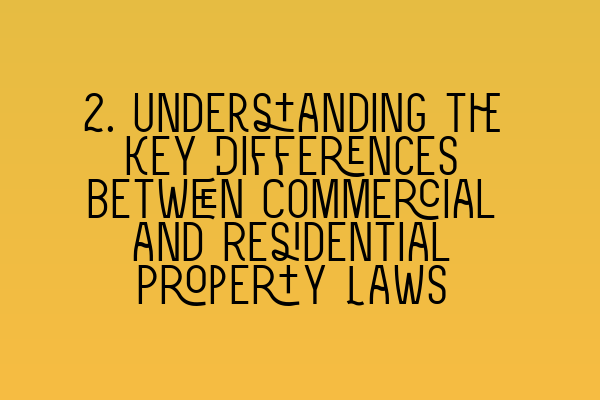Understanding the Key Differences between Commercial and Residential Property Laws
When it comes to property law, there are significant differences between commercial and residential properties. As a solicitor specializing in property law, it is crucial to have a clear understanding of these differences in order to provide the best possible legal advice and representation to your clients. In this blog post, we will explore the key distinctions between commercial and residential property laws and highlight their importance in practice.
Commercial Property Law
Commercial property law deals with properties that are used for business purposes. It encompasses any property that is used for commercial activities, such as office buildings, retail stores, warehouses, factories, and hotels. The primary focus of commercial property law is on the rights and obligations of businesses, landlords, and tenants.
One of the key differences between commercial and residential property laws is the nature of the lease agreements. Commercial leases tend to be more complex and detailed compared to residential leases. They often involve longer lease terms, specific clauses related to insurance, repairs, maintenance, and provisions for rent increases. As a solicitor, it is essential to ensure that commercial leases are well-drafted and negotiated to protect the interests of your clients.
Another significant distinction is the protection granted to tenants. While residential tenants have more legal safeguards under various housing laws, commercial tenants have fewer protections. Commercial leases are generally seen as more “arms length” transactions, with the assumption that both parties are knowledgeable and capable of negotiating their own terms.
Commercial property law also deals with issues related to planning and zoning regulations. Businesses often need to obtain planning permission and comply with zoning laws to operate legally. As a solicitor, it is necessary to navigate these complex regulations and advise your clients on compliance and any potential limitations or restrictions.
Residential Property Law
Residential property law, on the other hand, revolves around properties used for residential purposes, such as houses, apartments, and condominiums. It primarily focuses on the rights and obligations of landlords and tenants.
One of the most significant differences between commercial and residential property laws is the level of protection provided to residential tenants. Residential tenancies are subject to various housing laws, which offer tenants safeguards against unfair eviction, rent increases, and poor living conditions. Tenancy agreements for residential properties are typically more standardized and regulated, aiming to ensure fair treatment for tenants.
In residential property transactions, it is common for individuals to rely on mortgage financing. As a solicitor, you play a crucial role in guiding clients through the process of obtaining mortgages, conducting property searches, and ensuring compliance with necessary legal requirements.
Factors to Consider
Understanding these key differences between commercial and residential property laws is essential for solicitors specializing in property law. Each area has its own unique set of legal considerations, and clients rely on their solicitors to provide expert advice and guidance throughout the process.
It is crucial to stay up to date with any changes or updates in property laws, as they can often have a significant impact on your clients. Regular training and professional development courses, such as the SQE 1 and SQE 2 preparation courses offered by SQE Property Law & Land Law, can help you stay abreast of the latest developments in property law.
Conclusion
As a solicitor specializing in property law, understanding the key differences between commercial and residential property laws is paramount. Commercial property law deals with properties used for business purposes, involving more complex lease agreements and fewer tenant protections. Residential property law, on the other hand, encompasses properties used for residential purposes and provides more extensive tenant safeguards.
By acquiring a comprehensive understanding of these distinctions and staying informed about changes and updates in property law, you can provide the best possible legal advice and representation to your clients. If you are preparing for your SQE exams, consider taking advantage of the preparation courses offered by SQE Property Law & Land Law to further enhance your knowledge and skills in property law.
Related Articles:
– SQE 1 Practice Exam Questions
– SQE 1 Practice Mocks FLK1 FLK2
– SQE 2 Preparation Courses
– SQE 1 Preparation Courses
– SRA SQE Exam Dates
